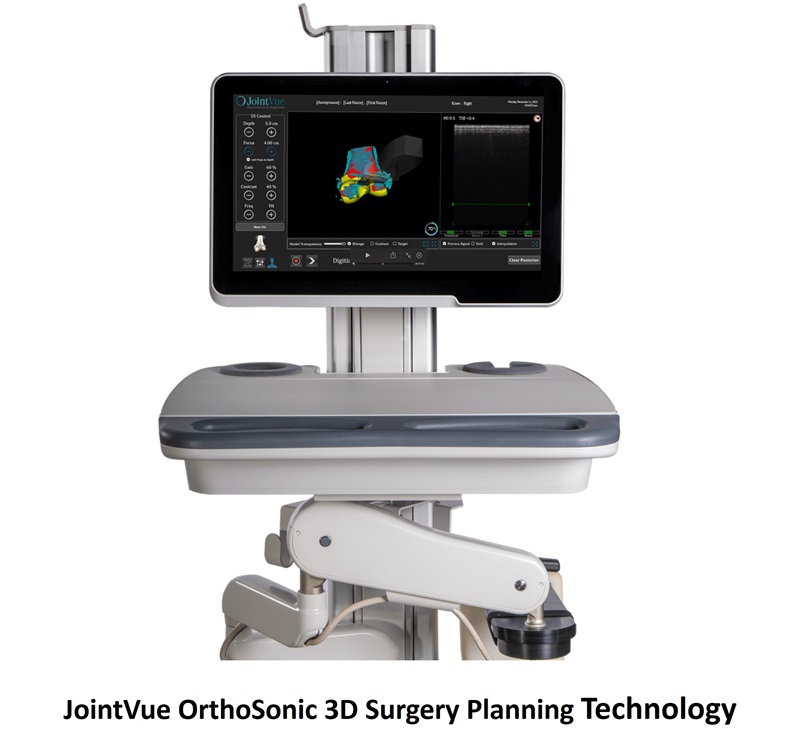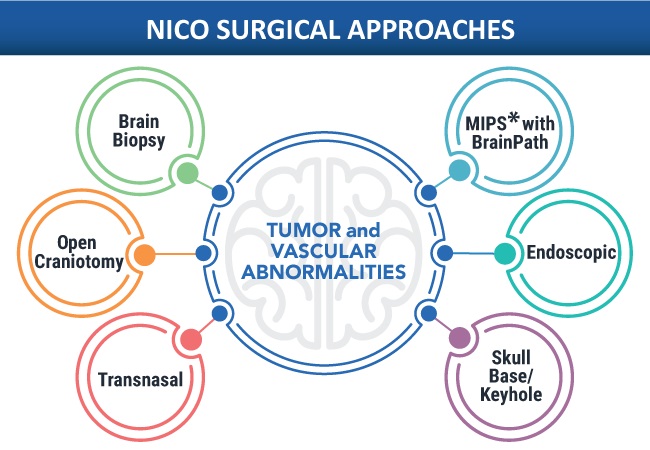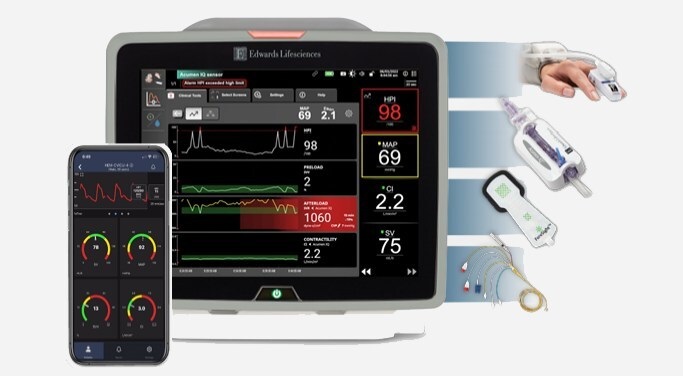Tiny Ingestible Sensor Monitors Drug Adherence
|
By HospiMedica International staff writers Posted on 22 Jul 2015 |
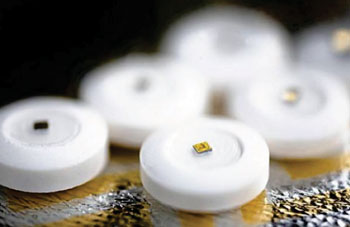
Image: The Proteus Ingestible sensor embedded into a pill (Photo courtesy of Proteus Digital Health).
A sensor the size of a grain of sand can now be used to monitor a patient’s adherence to medication and communicate the data to caregivers.
The Proteus Ingestible sensor is just 1 mm square in size, and is made mostly of silicon and miniature electronics. It does not contain a battery, but is instead powered for a short amount of time by contact between two conductive materials and stomach acid. At that time, it sends a signal to the proprietary Proteus Patch—an adhesive patch worn on the torso—which records the exact time the medication was taken, as well as the unique identity of the drug. The ingestible sensor can be integrated with the medication itself.
Besides time of ingestion, the Proteus Patch can also record rest and heart rate, body position, and activity, and communicates the data to a mobile app via Bluetooth. With the patient’s consent, the information is then accessible to caregivers and clinicians, helping individuals develop and sustain healthy habits, families make better health choices, and clinicians provide more effective, data-driven care. The Proteus Ingestible sensor and Patch are products of Proteus Digital Health (Redwood City, CA, USA), and have been approved by the US Food and Drug Administration (FDA).
“The new system is the first time adherence data from Proteus’s system will integrate directly into an electronic data capture system,” said the company in a press statement. “It will allow clinical trial investigators access to accurate medication adherence data, something for which they currently rely on self-reporting and occasional lab tests.”
Related Links:
Proteus Digital Health
The Proteus Ingestible sensor is just 1 mm square in size, and is made mostly of silicon and miniature electronics. It does not contain a battery, but is instead powered for a short amount of time by contact between two conductive materials and stomach acid. At that time, it sends a signal to the proprietary Proteus Patch—an adhesive patch worn on the torso—which records the exact time the medication was taken, as well as the unique identity of the drug. The ingestible sensor can be integrated with the medication itself.
Besides time of ingestion, the Proteus Patch can also record rest and heart rate, body position, and activity, and communicates the data to a mobile app via Bluetooth. With the patient’s consent, the information is then accessible to caregivers and clinicians, helping individuals develop and sustain healthy habits, families make better health choices, and clinicians provide more effective, data-driven care. The Proteus Ingestible sensor and Patch are products of Proteus Digital Health (Redwood City, CA, USA), and have been approved by the US Food and Drug Administration (FDA).
“The new system is the first time adherence data from Proteus’s system will integrate directly into an electronic data capture system,” said the company in a press statement. “It will allow clinical trial investigators access to accurate medication adherence data, something for which they currently rely on self-reporting and occasional lab tests.”
Related Links:
Proteus Digital Health
Latest Health IT News
- Machine Learning Model Improves Mortality Risk Prediction for Cardiac Surgery Patients
- Strategic Collaboration to Develop and Integrate Generative AI into Healthcare
- AI-Enabled Operating Rooms Solution Helps Hospitals Maximize Utilization and Unlock Capacity
- AI Predicts Pancreatic Cancer Three Years before Diagnosis from Patients’ Medical Records
- First Fully Autonomous Generative AI Personalized Medical Authorizations System Reduces Care Delay
- Electronic Health Records May Be Key to Improving Patient Care, Study Finds
- AI Trained for Specific Vocal Biomarkers Could Accurately Predict Coronary Artery Disease
- First-Ever AI Test for Early Diagnosis of Alzheimer’s to Be Expanded to Diagnosis of Parkinson’s Disease
- New Self-Learning AI-Based Algorithm Reads Electrocardiograms to Spot Unseen Signs of Heart Failure
- Autonomous Robot Performs COVID-19 Nasal Swab Tests

- Statistical Tool Predicts COVID-19 Peaks Worldwide
- Wireless-Controlled Soft Neural Implant Stimulates Brain Cells
Channels
Surgical Techniques
view channel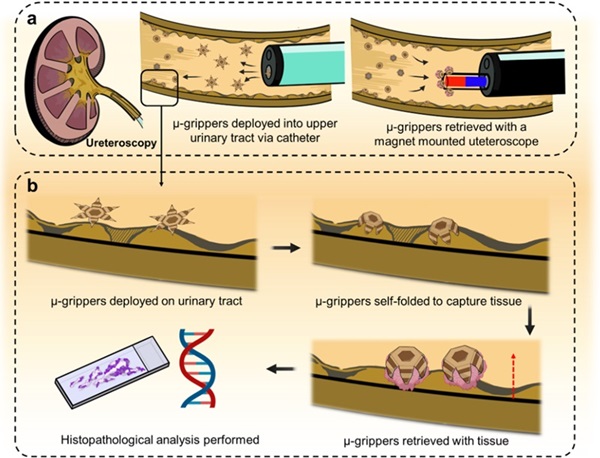
Microgrippers For Miniature Biopsies to Create New Cancer Diagnostic Screening Paradigm
The standard diagnosis of upper urinary tract cancers typically involves the removal of suspicious tissue using forceps, a procedure that is technically challenging and samples only a single region of the organ.... Read moreMiniature Soft Lithium-Ion Battery Could Be Used as Defibrillator During Surgery
The development of tiny smart devices, measuring just a few cubic millimeters, requires equally miniature power sources. For minimally invasive biomedical devices that interact with biological tissues,... Read more.jpg)
TAVI Procedure Supported by Radial Artery Access Reduces Bleeding Complications
The TAVI procedure, or Transcatheter Aortic Valve Implantation, is a minimally invasive technique in which a new aortic valve is inserted through a femoral artery to replace a narrowed old valve.... Read more
Portable Surgical Robot Seamlessly Integrates into Any OR for Performing Cholecystectomy Procedures
The United States represents a significant market with a strong demand for a flexible surgical robotic system applicable across various care settings. However, there has been a lack of sufficient options... Read morePatient Care
view channel
Portable Biosensor Platform to Reduce Hospital-Acquired Infections
Approximately 4 million patients in the European Union acquire healthcare-associated infections (HAIs) or nosocomial infections each year, with around 37,000 deaths directly resulting from these infections,... Read moreFirst-Of-Its-Kind Portable Germicidal Light Technology Disinfects High-Touch Clinical Surfaces in Seconds
Reducing healthcare-acquired infections (HAIs) remains a pressing issue within global healthcare systems. In the United States alone, 1.7 million patients contract HAIs annually, leading to approximately... Read more
Surgical Capacity Optimization Solution Helps Hospitals Boost OR Utilization
An innovative solution has the capability to transform surgical capacity utilization by targeting the root cause of surgical block time inefficiencies. Fujitsu Limited’s (Tokyo, Japan) Surgical Capacity... Read more
Game-Changing Innovation in Surgical Instrument Sterilization Significantly Improves OR Throughput
A groundbreaking innovation enables hospitals to significantly improve instrument processing time and throughput in operating rooms (ORs) and sterile processing departments. Turbett Surgical, Inc.... Read moreHealth IT
view channel
Machine Learning Model Improves Mortality Risk Prediction for Cardiac Surgery Patients
Machine learning algorithms have been deployed to create predictive models in various medical fields, with some demonstrating improved outcomes compared to their standard-of-care counterparts.... Read more
Strategic Collaboration to Develop and Integrate Generative AI into Healthcare
Top industry experts have underscored the immediate requirement for healthcare systems and hospitals to respond to severe cost and margin pressures. Close to half of U.S. hospitals ended 2022 in the red... Read more
AI-Enabled Operating Rooms Solution Helps Hospitals Maximize Utilization and Unlock Capacity
For healthcare organizations, optimizing operating room (OR) utilization during prime time hours is a complex challenge. Surgeons and clinics face difficulties in finding available slots for booking cases,... Read more
AI Predicts Pancreatic Cancer Three Years before Diagnosis from Patients’ Medical Records
Screening for common cancers like breast, cervix, and prostate cancer relies on relatively simple and highly effective techniques, such as mammograms, Pap smears, and blood tests. These methods have revolutionized... Read morePoint of Care
view channel
Handheld, Sound-Based Diagnostic System Delivers Bedside Blood Test Results in An Hour
Patients who go to a doctor for a blood test often have to contend with a needle and syringe, followed by a long wait—sometimes hours or even days—for lab results. Scientists have been working hard to... Read more
Smartphone-Enabled, Paper-Based Quantitative Diagnostic Platform Transforms POC Testing
Point-of-care diagnostics are crucial for public health, offering rapid, on-site testing that enables prompt diagnosis and treatment. This is especially valuable in remote or underserved regions where... Read moreBusiness
view channel
Hologic Acquires Gynesonics to Strengthen Existing Gynecological Surgical Business
Hologic (Marlborough, MA, USA) has signed a definitive agreement to acquire Gynesonics (Redwood City, CA, USA) for approximately USD 350 million, subject to working capital and other customary closing adjustments.... Read more